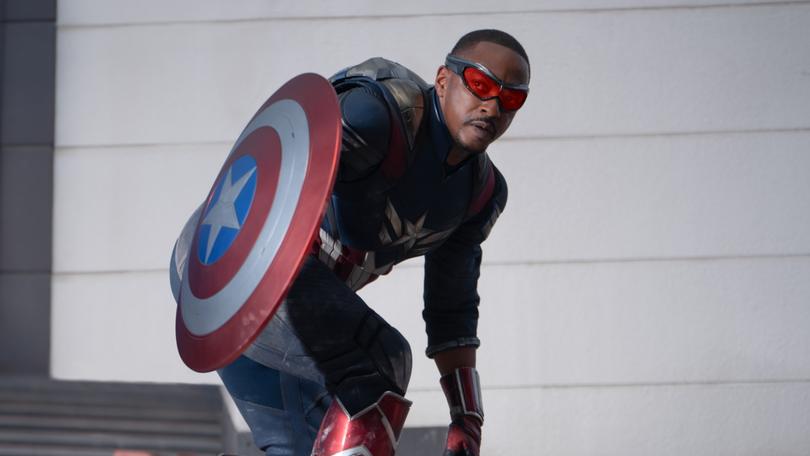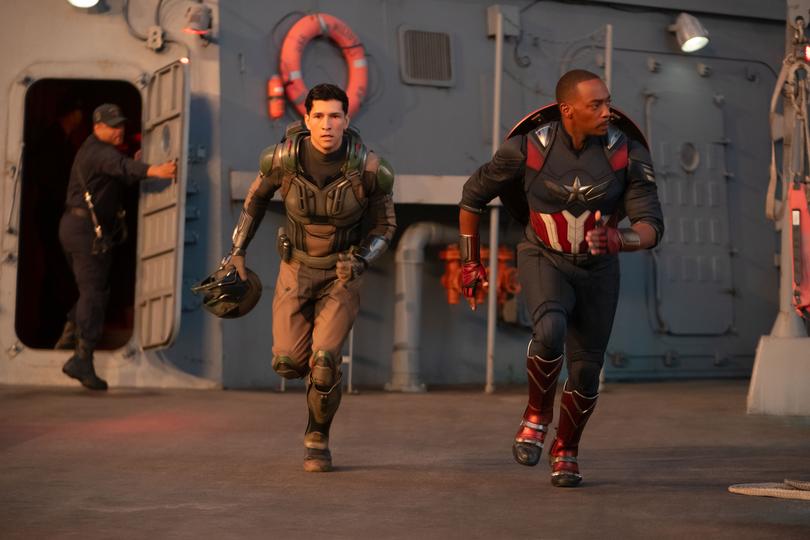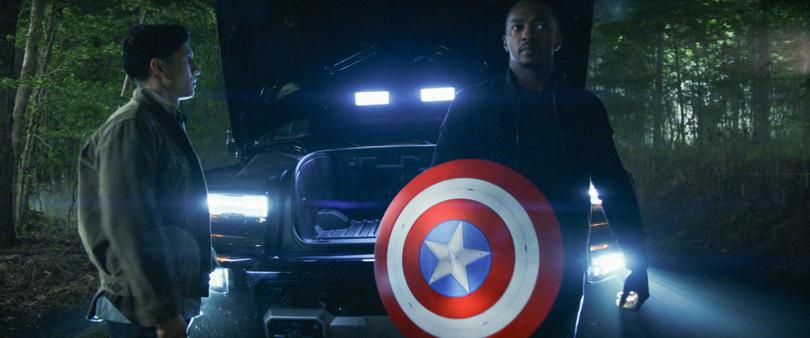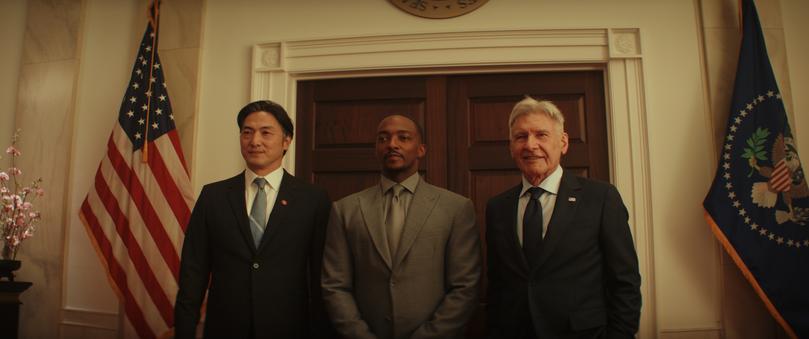Marvel’s Nate Moore on the symbolism of Anthony Mackie’s Captain America: Brave New World
At a time of turmoil and confusion, how can a Marvel comic book movie engage with America’s reputation on the global stage?

When the Marvel folks started mapping out Captain America: Brave New World, it was just coming out of the 2021 series The Falcon and the Winter Soldier.
In four years, a lot has changed.
The conversations the streaming series started about what it means to be a superhero whose title literally has the word “America” in it, has evolved.
Sign up to The Nightly's newsletters.
Get the first look at the digital newspaper, curated daily stories and breaking headlines delivered to your inbox.
By continuing you agree to our Terms and Privacy Policy.The series, released in the wake of the Black Lives Matter movement, focused on the symbolism of a Black man taking the famous shield, but four years later, it’s engaged in what America can stand for on the global stage.
“We’ve been working on this movie for a handful of years and the climate both domestically and internationally is always changing and evolving,” Marvel executive and Captain America: Brave New World producer Nate Moore told The Nightly.

“Sometimes, it just happens that I think a film comes out at a time when people are talking about similar issues, and I think that’s interesting.
“Art has always helped us to figure out how we view the real world, or at least give you a lens or a context to talk about the real world. So none of it is necessarily intentional, but certainly it’s there if you’re looking for it.”
You can’t help but look for it. Not three weeks after Donald Trump was sworn in for his second term as president, America’s role in international affairs dominates headlines hourly. With tariffs and trade wars, the threatened annexation of Greenland and who “owns” Gaza, America’s reputation globally has shifted.
How does a film like Captain America: Brave New World, released all over the world by a company who embodies American cultural soft power, Disney, enter that fray?
It’s not exactly Matt Stone and Trey Parker’s satirical Team America: World Police, which was released during the post-9/11 “War on Terror”, but it is a representation of the idea of America, but an earnest one.
The character of Sam Wilson was introduced in Captain America: Winter Soldier, which happened to be Moore’s first project when he joined Marvel. He was even part of casting Anthony Mackie in that role.

It’s a full circle moment for Moore, who is leaving Marvel after the release of Brave New World, although he will remain involved in producing forthcoming Black Panther movies and series.
With the exit of Chris Evans’ Steve Rogers from the franchise in 2019 (Evans is due to return in 2026 albeit in an unconfirmed role), Sam was the natural successor to Cap’s title.
“Captain America is a mantle that suggests an aspiration for an ideal,” Moore explained. “The blessing and the curse of an ideal is it’s almost impossible to attain, but the characters who try are the ones who tend to over-index in integrity, self-sacrifice, compassion and empathy.
“We knew Sam had that in spades. When you think about how he was introduced, he was a counsellor for military (veterans). He was already on his journey of trying to help others through his work, and then he got sucked into the larger (Marvel Cinematic Universe).
“But he never lost that connection to his humanity and to the things that he felt was relevant, which is helping others, empathy and trying to find connecting points to people who have conflict.”
The film finds Sam now officially Captain America and trying to forge an effective working relationship with the recently elected president, Thaddeus “Thunderbolt” Ross (Harrison Ford, replacing the William Hurt), a former general who has frequently been a foil to the Avengers.

The relationship between them men is dicey. Ross threw Sam in a secret prison at the end of Captain America: Civil War after he and others rebelled against accords that subsumed the Avengers’ autonomy under the US government.
When an attack, seemingly from within, is launched, Sam must work to stop it and the real players at the helm.
Distrust is the foundation of the film, which draws inspiration from paranoid political conspiracy thrillers The Manchurian Candidate and The Day of the Jackal.
Scepticism, if not outright distrust, is also prevalent in the real-world. Misinformation and disinformation is rampant online, faith in established institutions is eroding and many would argue that an end-times vibe is hanging over public discourse.
If Sam is a symbol as well as a person, how can he counter that? How do you aim for the ideal when it feels that much harder in an “America First” era.
Moore made a strident argument that what community means in 2025 has expanded.
“Sam is not only minding the people directly around him, it’s about the larger community, and being a citizen of the world. That’s something we’re all tasked with.
“It’s easy to retreat inside yourself or your family because sometimes the world feels scary when you engage with it, but it’s important that we do all engage with it, and that we are stewards for each other and for the world because that’s the only way we’re going to make it through some of these complicated times that we find ourselves in.
“America is part of a bigger conversation. It is not monolithic, nor can it exist on its own, it is part of the world and Captain America, as a representation of the best of America, has to interact with the world. He just has to.”
Captain America: Brave New World is in cinemas on February 13

